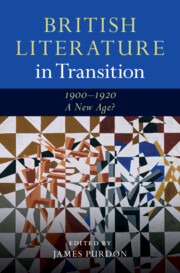Book contents
- British Literature in Transition, 1900–1920: A New Age?
- British Literature in Transition Series
- British Literature in Transition, 1900–1920: A New Age?
- Copyright page
- Contents
- Contributors
- General Editor’s Preface
- Acknowledgements
- Introduction
- Part I Nation and Empire
- Part II Media
- Part III Aesthetics
- Chapter 12 Transitions, Turns
- Chapter 13 Poetry and Transition
- Chapter 14 Realism and Mass Politics
- Chapter 15 Short Fiction
- Chapter 16 Ideals of a Picture Gallery
- Part IV Society
- Index
Chapter 13 - Poetry and Transition
from Part III - Aesthetics
Published online by Cambridge University Press: 07 December 2021
- British Literature in Transition, 1900–1920: A New Age?
- British Literature in Transition Series
- British Literature in Transition, 1900–1920: A New Age?
- Copyright page
- Contents
- Contributors
- General Editor’s Preface
- Acknowledgements
- Introduction
- Part I Nation and Empire
- Part II Media
- Part III Aesthetics
- Chapter 12 Transitions, Turns
- Chapter 13 Poetry and Transition
- Chapter 14 Realism and Mass Politics
- Chapter 15 Short Fiction
- Chapter 16 Ideals of a Picture Gallery
- Part IV Society
- Index
Summary
One traditional solution to the problem of how modernist poetry began is to tell the story of a transition between Yeats’s early masterpieces and Eliot’s The Waste Land. This is a story which usually centres upon the rise of free verse and a growing urgency to represent the modern world. More recently, critics have looked to tell stories about neglected poets, in which less obviously experimental works are found nevertheless to represent that same modern world. Both approaches involve tracing continuities and ruptures, often with reference to the unprecedented ruptures and rapid developments which characterised life in Britain in the first two decades of the century. This chapter shifts the emphasis from deciding how poetry somehow made a miraculous leap from the fin de siècle to high modernism, to exploring how the poetic forms of diverse poets working at this time refract the very conception and experience of transition, and especially the experience of transition when no certain beginning or end is in sight. The aim here is thus to resist the logic of literary history’s usual narratives, and to show that the poems of this period do so too at the level of poetic technique.
- Type
- Chapter
- Information
- British Literature in Transition, 1900–1920: A New Age? , pp. 244 - 259Publisher: Cambridge University PressPrint publication year: 2021

